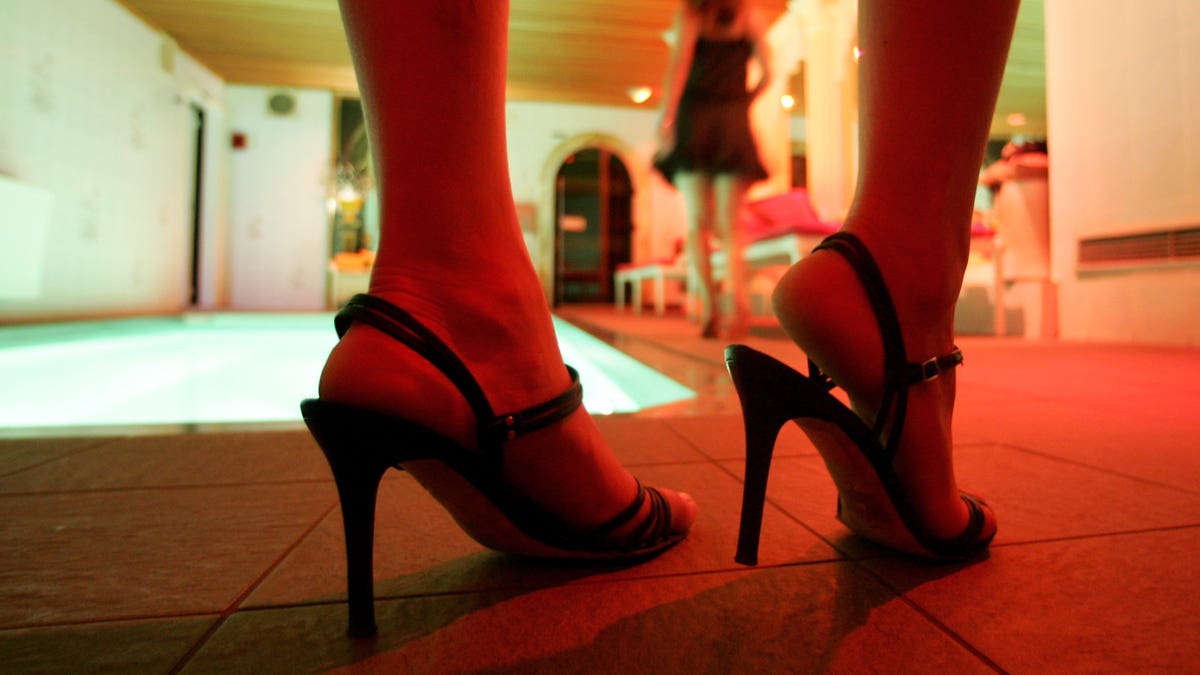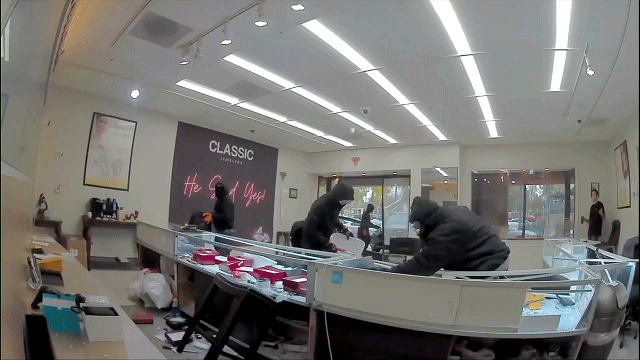Sara Carter: Children as young as 8 years old sold into prostitution at border
Fox News' Sara Carter uncovers more evidence of sex trafficking at the US-Mexico border on 'Hannity'
A long list of jurisdictions have moved to deregulate prostitution in recent years, prompting concerns that the nature of the industry and barriers to law enforcement could lead to an increase in human trafficking.
Leaders in Ann Arbor, Michigan, reportedly argued as much about law enforcement when they opposed a decriminalization measure that was rejected by the city council last week. Besides Ann Arbor, states and localities from New York to California have considered a variety of methods for loosening restrictions on prostitution.
Earlier this week, an advocacy group reportedly withdrew its petition to decriminalize the practice in Oregon, noting that it wanted to improve its policy. And as Manhattan's new prosecutor Alvin Bragg showed, the changes don't always need to come through legislation or ordinances. Bragg committed to not prosecuting those offenses.
California's legislature recently showed how smaller policy changes can also raise concerns about efforts to enforce trafficking laws. Legislators passed a bill that would decriminalize loitering for the purpose of prostitution – something advocates say would alleviate pressure from an already-burdened group of people.
But critics have once again cautioned that removing those restrictions will hinder efforts to investigate trafficking. For example, police might use loitering laws as a basis for pursuing a situation where a minor or trafficked adult could be discovered.
ALLEGED SEX TRAFFICKING SURVIVORS SAY NEVADA VIOLATED CONSTITUTION'S SLAVERY BAN: LAWSUIT
"We're seeing efforts around the country to fully decriminalize prostitution at the demand of the commercial sex industry which cannot grow without exploiting more people’s bodies," said Dawn Hawkins, CEO of the National Center on Sexual Exploitation (NCOSE). "The real objective of full decriminalization is a deregulated prostitution marketplace, where sex buyers, pimps and brothel owners can sexually exploit people with impunity.

Escort girls await customers at Berlin's exclusive Night Club Bel Ami in May 2006 in Berlin, Germany. (Andreas Rentz/Getty Images)
"To do that, the commercial sex industry normalizes prostitution by redefining it as ‘sex work’ and saying it is a job like any other. The industry preys upon marginalized, vulnerable populations by offering them prostitution as ‘work.’ But prostitution inevitably leads to physical, emotional and psychological trauma."
But the Urban Justice Center argues that prostitution, pornography and other forms of "sex work" provide valid sources of income for many.
R.J. Thompson, who leads the Sex Workers Project (SWP) at the Urban Justice Center, told Fox News Digital his prior work in the industry was rewarding in multiple ways. He says the money he made helped him get out of debt as an attorney and provided "many layers and levels of empowerment."
"For me and for many people, sex work has many layers and levels of empowerment – both for ourselves as workers and also for many of our clients … One thing that I didn't really realize before becoming an escort was how helpful that would be to my clients emotionally and even spiritually. I'm Buddhist and I introduced some of my clients who were interested in Buddhism to the practice."
He added that escorting might provide emotional companionship or involve end-of-life care.
CALIFORNIA PROSTITUTION BILL ADVANCES, WOULD DECRIMINALIZE LOITERING WITH INTENT
Is prostitution just like any other industry?
Both sides of the debate are clear in their opposition to human trafficking but differ on the best way to achieve that, in addition to keeping those in the industry safe.
A large portion of this debate appears to be informed by how a person views prostitution and whether it is inherently objectifying. If it isn't, does the industry use participants' bodies in similarly exploitative ways as other industries? NCOSE has raised concerns about violence in prostitution, suggesting that it uniquely predisposes individuals to that type of activity.
"We're opposed to violence and exploitation in our work," said Thompson. "But … if people don't think there is violence in farm work or other labor sectors, or domestic work, they're wrong. Violence and exploitation exists in all these labor sectors.
"There's nothing inherent about sex work that makes it more prone to violence other than the fact that because of stigma and because of shame and stigma against sex work, we as sex workers are – for people who want to cause violence – we're expendable people. We're easy targets for violence because people think we're less than moralistically."
He added that "most of my clients have really affirmed my humanity. I've even had clients tell me that I have made them feel seen and validated and cared for in ways that they have never felt or not felt in years – and that's profoundly meaningful to me."
But according to Bekah Charleston, a former prostitute, the industry begets dehumanization. "When people think they have power and control to purchase other human beings, you are completely degraded, you are completely dehumanized, and you're looked at like a product," Charleston told Fox News Digital.
"When somebody pays you for your body, they expect you to perform and do what they want and not talk … and not be a human. They basically pay you to disassociate and not be an actual human being in those transactions – and then they discard you."
Charleston claims that her ex-boyfriend forced her into prostitution but, at times, she also voluntarily engaged in the practice due to social and economic pressures.
Social and economic pressures, though, are generally what advocates on the other side see as justifications for liberalizing prostitution laws.
"Sex work is a very readily available option for people who are migrants and/or transgender because they face such legal and social barriers to employment in other sectors," said Thompson, whose organization advocates for full decriminalization.
THE INFILTRATION OF WOKE DA'S INTO THE JUSTICE SYSTEM WILL NOT BE EASY TO FIX
Does deregulating prostitution lead to more trafficking?
Nevada, in particular, has become a focal point for this debate as it's the only state to continually legalize prostitution – something critics say has led to trafficking. NCOSE and purported survivors sued the state last year, alleging that it had failed to comply with the 13th Amendment, which was originally intended to end slavery.
Charleston, who says she was trafficked in Nevada, told Fox News Digital she had horrible experiences working in a brothel. She said prostitution as an industry isn't so much liberating as it is a trap in which sellers cycle through violence, slavery and poor working conditions.
It's an "abject lie," Charleston argues, to say that legalizing prostitution will make it safer and healthier. "It couldn't be further from the truth, and I can say that not only as a trafficking survivor but as a prostitution survivor," she told Fox News Digital this month.
Thompson disputes that.
"For people who say that all sex work is always objectifying and exploitative – that invisibilizes and flies in the face of the lived reality" of people "who have engaged in sex work by choice and circumstance," Thompson said.
In seeking to make the industry safer, advocates have floated a variety of policy proposals. Both NCOSE and SWP support decriminalizing the selling of prostitution, but they differ on whether buyers should face criminal penalties as well.
Some countries in Europe have attempted to legalize the practice. Others have pursued what's known as the Nordic model, which decriminalizes selling rather than buying.
The London School of Economics previously examined 150 countries and concluded that nations with legalized prostitution tended to see higher inflows of trafficking. However, that 2013 study cautioned against using its findings to ban prostitution, arguing that legalization could improve conditions for sellers.
A long list of organizations, including Amnesty International and the World Health Organization, have expressed support for some kind of legalization.
MANHATTAN DA ALVIN BRAGG GIVES MANY MISDEMEANORS A PASS AS NEW MAYOR VOWS TO COMBAT GROWING CRIME
The Open Society Foundations, led by progressive billionaire George Soros, argues that decriminalization promotes safe working conditions, reduces the risk of spreading sexually transmitted diseases and helps prevent abuses.
"When sex work is decriminalized, sex workers can press for safer working conditions and use the justice system to seek redress for discrimination and abuse," the group says. "Sex workers are more likely to live without stigma, social exclusion or fear of violence."
Thompson's organization also points to New Zealand, which it says has the "most comprehensive decriminalization of sex work of any country in the world." Years after the decriminalization bill passed, New Zealand's government issued a report concluding that the "sex industry has not increased in size, and many of the social evils predicted by [critics] have not been experienced." It added that the "vast majority of people in the sex industry are better off."
CLICK HERE TO GET THE FOX NEWS APP
SWP's reporting acknowledges that it's difficult to make claims about effects on human trafficking but says the country saw low levels before and after reform. It's unclear exactly how much New Zealand authorities were able to investigate levels of trafficking. NCOSE has noted, however, that the U.S. State Department downgraded New Zealand in its 2021 trafficking in persons report. It stated that "[t]he Government of New Zealand does not fully meet the minimum standards for the elimination of trafficking."
In the U.S., Rhode Island decriminalized prostitution between 1980 and 2009, providing a case study for researchers seeking to determine the effects of decriminalization. NCOSE has pointed to a Wake Forest Law Review article arguing that decriminalization prompted an increase in prostitution and hindered law enforcement's efforts to prevent trafficking.









































